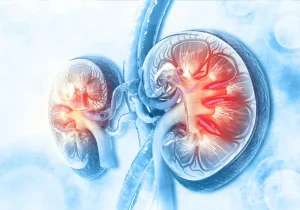The pair of kidneys is one of the most important organs in our body. They are each about the size of an adult fist, located in the region of our lower backs. The kidneys are commonly known for their excretory function – filtering 200 litres of blood daily to produce around 2 litres of urine. It is an important organ in maintaining the human body’s blood pressure, electrolyte balance and calcium levels. Chronic kidney disease (CKD) manifests with gradual loss of kidney function over months to years. In early stages of CKD, patients might have very few signs or symptoms. In many cases patients do not realize the presence of CKD until an advanced stage. For more information on the symptoms, diagnosis and treatment for CKD, click here.
Complications of chronic kidney disease include anaemia, metabolic acidosis, osteoporosis, and cardiovascular disease. This article will look into each in detail and discuss their management.

Figure 1. Kidney
1. Anaemia
Anaemia is a deficiency in the number and/or quality of the red blood cells in our body. The production and maturation of red blood cells take place in bone marrow, with the help of a key enzyme – erythropoietin, which is produced by the kidneys. With chronic kidney damage, the kidney gradually loses its ability to produce this enzyme, thus red blood cell production diminishes.
Symptoms
- Fatigue
- Weakness
- Pale or yellowish skin
- Shortness of breath
- Chest pain
- Cold hands and feet
- Irregular heartbeats
- Headaches
Management
- Anaemia as a result of CKD does not have any direct treatments. Treatment of CKD could effectively delay the onset of anaemia and alleviate its symptoms.
- Blood transfusion could be considered under extreme circumstances.
2. Metabolic Acidosis
Metabolic acidosis is a medical condition where the body has higher than normal acidic content. The kidneys are an important organ in regulating our acid-base equilibrium by excreting acid and retaining some bicarbonate.
Symptoms
- Confusion
- Fatigue
- Long and deep breath
- Fast heartbeat
- Nausea and vomiting
Management
- Alkali therapy: taking extra bicarbonate could help alleviate symptoms of acidosis and help maintain the blood acid-base equilibrium.
3. Osteoporosis
Osteoporosis is a condition where bones become thin, weak and fragile. It is due to chronic activation of bone killing cells with gradual loss of bony structures. The kidneys function to retain blood calcium level and in CKD, the kidneys fail to retain enough calcium. Our bones are rich in calcium and in order to maintain their calcium levels, our body activates bone killing cells to digest bones and release bony calcium to blood circulation.
Symptoms
- Frequent fractures
- Stooped posture
- Loss of height over time
Management
- Calcium and Vitamin D supplement
4. Cardiovascular Disease
The kidneys under normal circumstances also help maintain blood volume by excreting or retaining water. In CKD, the kidneys lose this ability and excrete minimal amounts of urine instead. Thus, there is a significant increase in blood volume, which further results in an increase in blood pressure. This increase in blood pressure could eventually result in heart failure, stroke and many other life-threatening complications.
Symptoms
- Swollen ankles
- Shortness of breath
- Lethargy
- Irregular heartbeat
- Chest pain
- Visual disturbances – due to damaged blood vessel in eyes
- Headache
Management
- Calcium and Vitamin D supplement
5. Hyperkalemia
The kidneys are responsible for excreting potassium from blood in urine. In CKD, the kidneys gradually lose their ability to secrete potassium from blood to urine. This can lead to an increased level of potassium in the blood, also termed as hyperkalemia. Hyperkalemia may be life-threatening and require immediate medical intervention.
Symptoms
- Abdominal pain
- Diarrhoea
- Muscle weakness and numbness
- Heart palpitations and arrhythmia
- Nausea and vomiting
Management
- Insulin injection – insulin helps regulate the extra potassium in blood to body tissues.
- Diuretics – increase urination to excrete extra potassium in blood.
- Dialysis
